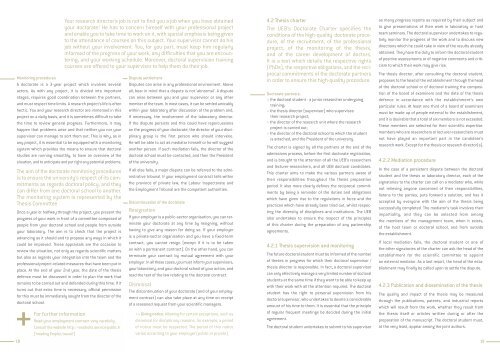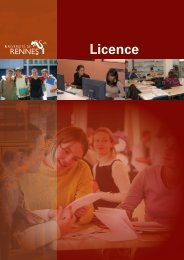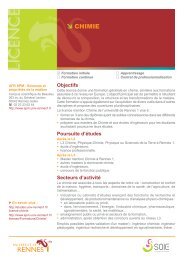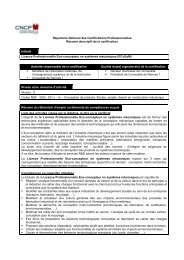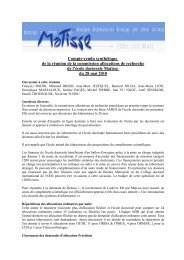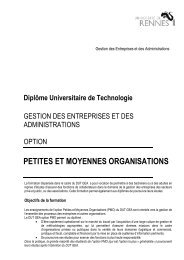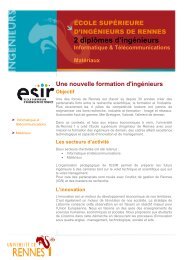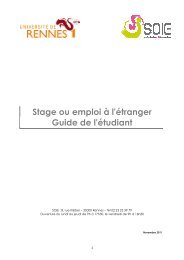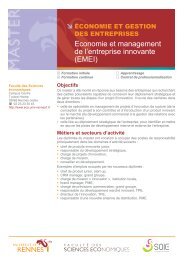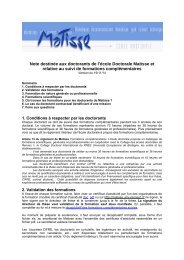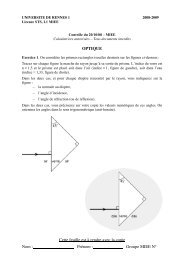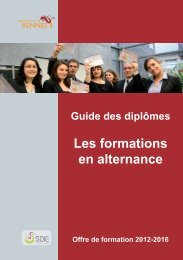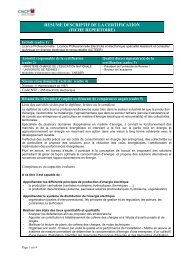a guide for the doctoral student in brittany - Université de Rennes 1
a guide for the doctoral student in brittany - Université de Rennes 1
a guide for the doctoral student in brittany - Université de Rennes 1
- No tags were found...
Create successful ePaper yourself
Turn your PDF publications into a flip-book with our unique Google optimized e-Paper software.
Your research director’s job is not to f<strong>in</strong>d you a job when you have obta<strong>in</strong>edyour doctorate! He has to concern himself with your professional projectand enable you to take time to work on it, with special emphasis be<strong>in</strong>g givento <strong>the</strong> attendance of courses on this subject. Your supervisor cannot do hisjob without your <strong>in</strong>volvement. You, <strong>for</strong> you part, must keep him regularly<strong>in</strong><strong>for</strong>med of <strong>the</strong> progress of your work, any difficulties that you are encounter<strong>in</strong>g,and your work<strong>in</strong>g schedule. Moreover, <strong>doctoral</strong> supervision tra<strong>in</strong><strong>in</strong>gcourses are offered to your supervisor to help <strong>the</strong>m do <strong>the</strong>ir job.Monitor<strong>in</strong>g proceduresA doctorate is a 3-year project which <strong>in</strong>volves severalactors. As with any project, it is divi<strong>de</strong>d <strong>in</strong>to importantstages, requires good coord<strong>in</strong>ation between <strong>the</strong> partners,and must respect time limits. A research project’s life is oftenhectic. You and your research director are immersed <strong>in</strong> thisproject on a daily basis, and it is sometimes difficult to take<strong>the</strong> time to review general progress. Fur<strong>the</strong>rmore, it mayhappen that problems arise and that nei<strong>the</strong>r you nor yoursupervisor can manage to sort <strong>the</strong>m out. This is why, as <strong>in</strong>any project, it is essential to be equipped with a monitor<strong>in</strong>gsystem which provi<strong>de</strong>s <strong>the</strong> means to ensure that <strong>doctoral</strong>studies are runn<strong>in</strong>g smoothly, to have an overview of <strong>the</strong>situation, and to anticipate and put right any potential problems.The aim of <strong>the</strong> doctorate monitor<strong>in</strong>g proceduresis to ensure <strong>the</strong> university’s respect of its commitmentsas regards <strong>doctoral</strong> policy, and <strong>the</strong>ycan differ from one <strong>doctoral</strong> school to ano<strong>the</strong>r.The monitor<strong>in</strong>g system is represented by <strong>the</strong>Thesis CommitteeOnce a year or halfway through <strong>the</strong> project, you present <strong>the</strong>progress of your work <strong>in</strong> front of a committee composed ofpeople from your <strong>doctoral</strong> school and people from outsi<strong>de</strong>your laboratory. The aim is to check that <strong>the</strong> project isadvanc<strong>in</strong>g as it should and to propose any ways <strong>in</strong> which itcould be improved. These appraisals are <strong>the</strong> occasion toreview <strong>the</strong> situation, not only as regards scientific mattersbut also as regards your <strong>in</strong>tegration <strong>in</strong>to <strong>the</strong> team and <strong>the</strong>professional project-related measures that have been put <strong>in</strong>place. At <strong>the</strong> end of your 2nd year, <strong>the</strong> date of <strong>the</strong> <strong>the</strong>sis<strong>de</strong>fence must be discussed <strong>in</strong> or<strong>de</strong>r to plan <strong>the</strong> work thatrema<strong>in</strong>s to be carried out and <strong>de</strong>fen<strong>de</strong>d dur<strong>in</strong>g this time. If itturns out that extra time is necessary, official permission<strong>for</strong> this must be immediately sought from <strong>the</strong> director of <strong>the</strong><strong>doctoral</strong> school.18For fur<strong>the</strong>r <strong>in</strong><strong>for</strong>mationRead your employment contract very carefully.Consult <strong>the</strong> website http: //vosdroits.service-public.fr(‘head<strong>in</strong>g Emploi, travail’)Dispute settlementDisputes can arise <strong>in</strong> any professional environment. Aboveall, bear <strong>in</strong> m<strong>in</strong>d that a dispute is not ‘abnormal’. A disputecan arise between you and your supervisor or any o<strong>the</strong>rmember of <strong>the</strong> team. In most cases, it can be settled amicablywith<strong>in</strong> your laboratory after discussion of <strong>the</strong> problem and,if necessary, <strong>the</strong> <strong>in</strong>volvement of <strong>the</strong> laboratory director.If <strong>the</strong> dispute persists and this could have repercussionson <strong>the</strong> progress of your doctorate, <strong>the</strong> director of your discipl<strong>in</strong>arygroup is <strong>the</strong> first person who should <strong>in</strong>tervene.He will be able to act as mediator himself or he will suggestano<strong>the</strong>r person. If such mediation fails, <strong>the</strong> director of <strong>the</strong><strong>doctoral</strong> school must be contacted, and <strong>the</strong>n <strong>the</strong> Presi<strong>de</strong>ntof <strong>the</strong> university.If all else fails, a major dispute can be referred to <strong>the</strong> adm<strong>in</strong>istrativetribunal. If your employment contract falls with<strong>in</strong><strong>the</strong> prov<strong>in</strong>ce of private law, <strong>the</strong> Labour Inspectorate and<strong>the</strong> Employment Tribunal are <strong>the</strong> competent authorities.Discont<strong>in</strong>uation of <strong>the</strong> doctorateResignationIf your employer is a public-sector organisation, you can term<strong>in</strong>ateyour doctorate at any time by resign<strong>in</strong>g, withouthav<strong>in</strong>g to give any reason <strong>for</strong> do<strong>in</strong>g so. If your employeris a private-sector organisation and you have a fixed-termcontract, you cannot resign (except if it is to be takenon with a permanent contract). On <strong>the</strong> o<strong>the</strong>r hand, you canterm<strong>in</strong>ate your contract by mutual agreement with youremployer. In all <strong>the</strong>se cases, you must <strong>in</strong><strong>for</strong>m your supervisors,your laboratory, and your <strong>doctoral</strong> school of your action, andread <strong>the</strong> text of <strong>the</strong> law relat<strong>in</strong>g to <strong>the</strong> <strong>doctoral</strong> contract.DismissalThe discont<strong>in</strong>uation of your doctorate (and of your employmentcontract) can also take place at any time on receiptof a reasoned request from your scientific managers.>> Giv<strong>in</strong>g notice: Allow<strong>in</strong>g <strong>for</strong> certa<strong>in</strong> exceptions, such asdismissal <strong>for</strong> discipl<strong>in</strong>ary reasons, <strong>for</strong> example, a periodof notice must be respected. The period of this noticevaries accord<strong>in</strong>g to your employer (public or private).4.2 Thesis charterThe UEB’s Doctorate Charter specifies <strong>the</strong>conditions of <strong>the</strong> high-quality doctorate procedure,of <strong>the</strong> recruitment, of <strong>the</strong> professionalproject, of <strong>the</strong> monitor<strong>in</strong>g of <strong>the</strong> <strong>the</strong>sis,and of <strong>the</strong> career <strong>de</strong>velopment of doctors.It is a text which <strong>de</strong>tails <strong>the</strong> respective rights(PhDs), <strong>the</strong> respective obligations, and <strong>the</strong> reciprocalcommitments of <strong>the</strong> doctorate partners<strong>in</strong> or<strong>de</strong>r to ensure this high-quality procedure.Doctorate partners:> <strong>the</strong> <strong>doctoral</strong> <strong>stu<strong>de</strong>nt</strong> - a junior researcher un<strong>de</strong>rgo<strong>in</strong>gtra<strong>in</strong><strong>in</strong>g;> <strong>the</strong> <strong>the</strong>sis director (supervisor) who supervises<strong>the</strong>ir research project;> <strong>the</strong> director of <strong>the</strong> research unit where <strong>the</strong> researchproject is carried out;> <strong>the</strong> director of <strong>the</strong> <strong>doctoral</strong> school to which <strong>the</strong> <strong>stu<strong>de</strong>nt</strong>is attached, and <strong>the</strong> Presi<strong>de</strong>nt of <strong>the</strong> university.The charter is signed by all <strong>the</strong> partners at <strong>the</strong> end of <strong>the</strong>admissions process, be<strong>for</strong>e <strong>the</strong> first doctorate registration,and is brought to <strong>the</strong> attention of all <strong>the</strong> UEB’s researchersand lecturer-researchers, and all UEB <strong>doctoral</strong> candidates.This charter aims to make <strong>the</strong> various partners aware of<strong>the</strong>ir responsibilities throughout <strong>the</strong> <strong>the</strong>sis preparationperiod. It also more clearly <strong>de</strong>f<strong>in</strong>es <strong>the</strong> reciprocal commitmentsby be<strong>in</strong>g a rem<strong>in</strong><strong>de</strong>r of <strong>the</strong> duties and obligationswhich have given rise to <strong>the</strong> regulations <strong>in</strong> <strong>for</strong>ce and <strong>the</strong>practices which have already been tried out, whilst respect<strong>in</strong>g<strong>the</strong> diversity of discipl<strong>in</strong>es and <strong>in</strong>stitutions. The UEBalso un<strong>de</strong>rtakes to ensure <strong>the</strong> respect of <strong>the</strong> pr<strong>in</strong>ciplesof this charter dur<strong>in</strong>g <strong>the</strong> preparation of any partnershipagreements.4.2.1 Thesis supervision and monitor<strong>in</strong>gThe future <strong>doctoral</strong> <strong>stu<strong>de</strong>nt</strong> must be <strong>in</strong><strong>for</strong>med of <strong>the</strong> numberof <strong>the</strong>ses <strong>in</strong> progress <strong>for</strong> which <strong>the</strong>ir <strong>doctoral</strong> supervisor /<strong>the</strong>sis director is responsible. In fact, a <strong>doctoral</strong> supervisorcan only effectively manage a very limited number of <strong>doctoral</strong><strong>stu<strong>de</strong>nt</strong>s at <strong>the</strong> same time if <strong>the</strong>y want to be able to keep upwith <strong>the</strong>ir work with all <strong>the</strong> attention required. The <strong>doctoral</strong><strong>stu<strong>de</strong>nt</strong> has <strong>the</strong> right to personal supervision from his<strong>doctoral</strong> supervisor, who un<strong>de</strong>rtakes to <strong>de</strong>vote a consi<strong>de</strong>rableamount of his time to <strong>the</strong>m. It is essential that <strong>the</strong> pr<strong>in</strong>cipleof regular frequent meet<strong>in</strong>gs be <strong>de</strong>ci<strong>de</strong>d dur<strong>in</strong>g <strong>the</strong> <strong>in</strong>itialagreement.The <strong>doctoral</strong> <strong>stu<strong>de</strong>nt</strong> un<strong>de</strong>rtakes to submit to his supervisoras many progress reports as required by <strong>the</strong>ir subject andto give presentations of <strong>the</strong>ir work <strong>in</strong> laboratory or hostteam sem<strong>in</strong>ars. The <strong>doctoral</strong> supervisor un<strong>de</strong>rtakes to regularlymonitor <strong>the</strong> progress of <strong>the</strong> work and to discuss newdirections which he could take <strong>in</strong> view of <strong>the</strong> results alreadyobta<strong>in</strong>ed. They have <strong>the</strong> duty to <strong>in</strong><strong>for</strong>m <strong>the</strong> <strong>doctoral</strong> <strong>stu<strong>de</strong>nt</strong>of positive assessments or of negative comments and criticismto which <strong>the</strong>ir work may give rise.The <strong>the</strong>sis director, after consult<strong>in</strong>g <strong>the</strong> <strong>doctoral</strong> <strong>stu<strong>de</strong>nt</strong>,proposes to <strong>the</strong> head of <strong>the</strong> establishment through <strong>the</strong> headof <strong>the</strong> <strong>doctoral</strong> school or of <strong>doctoral</strong> tra<strong>in</strong><strong>in</strong>g <strong>the</strong> compositionof <strong>the</strong> board of exam<strong>in</strong>ers and <strong>the</strong> date of <strong>the</strong> <strong>the</strong>sis<strong>de</strong>fence <strong>in</strong> accordance with <strong>the</strong> establishment’s ownparticular rules. At least one third of a board of exam<strong>in</strong>ersmust be ma<strong>de</strong> up of people external to <strong>the</strong> establishment,and it is <strong>de</strong>sirable that a total of six members is not excee<strong>de</strong>d.These members are selected <strong>for</strong> <strong>the</strong>ir scientific expertise.members who are researchers or lecturer-researchers mustnot have played an important part <strong>in</strong> <strong>the</strong> candidate’sresearch work. Except <strong>for</strong> <strong>the</strong> <strong>the</strong>sis or research director(s).4.2.2 Mediation procedureIn <strong>the</strong> case of a persistent dispute between <strong>the</strong> <strong>doctoral</strong><strong>stu<strong>de</strong>nt</strong> and <strong>the</strong> <strong>the</strong>sis or laboratory director, each of <strong>the</strong>signatories to <strong>the</strong> charter can call on a mediator who, whilenot reliev<strong>in</strong>g anyone concerned of <strong>the</strong>ir responsibilities,listens to <strong>the</strong> parties, puts <strong>for</strong>ward a solution, and has itaccepted by everyone with <strong>the</strong> aim of <strong>the</strong> <strong>the</strong>sis be<strong>in</strong>gsuccessfully completed. The mediator’s task <strong>in</strong>volves <strong>the</strong>irimpartiality, and <strong>the</strong>y can be selected from among<strong>the</strong> members of <strong>the</strong> management team, when it exists,of <strong>the</strong> host team or <strong>doctoral</strong> school, and from outsi<strong>de</strong><strong>the</strong> establishment.If local mediation fails, <strong>the</strong> <strong>doctoral</strong> <strong>stu<strong>de</strong>nt</strong> or one of<strong>the</strong> o<strong>the</strong>r signatories of <strong>the</strong> charter can ask <strong>the</strong> head of <strong>the</strong>establishment <strong>for</strong> <strong>the</strong> scientific committee to appo<strong>in</strong>tan external mediator. As a last resort, <strong>the</strong> head of <strong>the</strong> establishmentmay f<strong>in</strong>ally be called upon to settle <strong>the</strong> dispute.4.2.3 Publication and dissem<strong>in</strong>ation of <strong>the</strong> <strong>the</strong>sisThe quality and impact of <strong>the</strong> <strong>the</strong>sis may be measuredthrough <strong>the</strong> publications, patents, and <strong>in</strong>dustrial reportswhich will result from <strong>the</strong> work, whe<strong>the</strong>r <strong>the</strong>y result from<strong>the</strong> <strong>the</strong>sis itself or articles written dur<strong>in</strong>g or after <strong>the</strong>preparation of <strong>the</strong> manuscript. The <strong>doctoral</strong> <strong>stu<strong>de</strong>nt</strong> must,at <strong>the</strong> very least, appear among <strong>the</strong> jo<strong>in</strong>t authors.19


